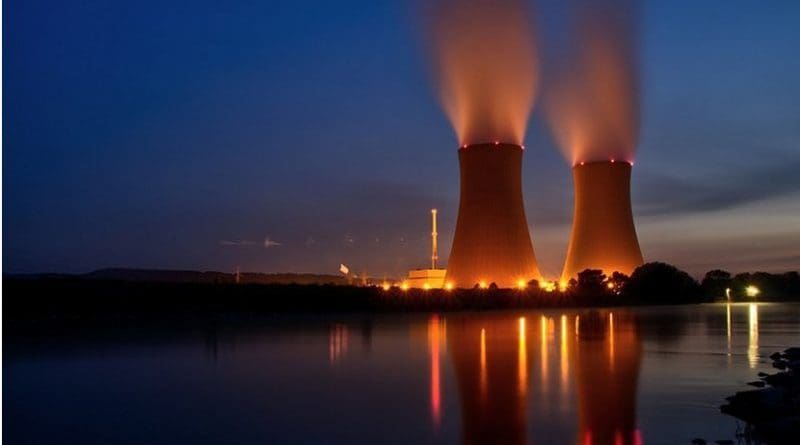Reconciliation Through Referendum: Potential Societal Benefits Of Popular Referendum(s) On Nuclear Power In US – OpEd
By Gerard Boyce
Reports of the deep internal divisions that wrack the world’s sole remaining superpower ensure that the upcoming US presidential election will be more closely watched round the globe than usual. As a result of this increased global attention, the policies of the two major American parties are going to come under greater scrutiny by the casual observers, media pundits and sundry commentators who have made an industry of predicting the result of what promises to be a close and bitterly contested race.
Considering the extent of these societal divisions, as exemplified by the acrimonious relations between leading candidates Democratic nominee Joe Biden and Republican presidential incumbent Donald Trump and the vast personal differences in style between them, it might come as a surprise to many that there is at least one key area in which the two major parties agree: the need for the US to support the nuclear industry and expand its nuclear power capacity. Whilst the Republican Party has expressed longstanding official support for the nuclear industry, the Democratic Party reversed its long-held position only recently (August 2020) by explicitly endorsing nuclear power as part of its election platform (Waldman, 2020). Granted, this major policy shift might have been overlooked by most observers fixated as many of them were on other aspects of the Democrats’ Green New Deal or otherwise convinced that the perceived chasm in policy positions between Democrats and Republicans when it comes to major topics like energy policy, climate change or immigration policy for example is an article of faith.
The Democratic Party’s official endorsement of nuclear power shows that nuclear power is far from the partisan issue it is often portrayed to be. It is revealing too that the Democratic Party saw fit to change its stance despite the fact that several recent surveys of Americans show that those who identify as Democrat or say that they will vote Democrat in the next election report being anti-nuclear; a result that has not significantly changed among members of this constituency since annual polls on the topic were first conducted (Reinhart, 2019). Results gathered from these and other sources also show that nuclear power does not enjoy overwhelming popular support among Americans, even amongst respondents drawn from constituencies such as Republicans where one would expect pro-nuclear sentiments to be much stronger. The level of support for nuclear power is even more tepid among members of groups such as young people, who are ultimately going to have to pay for the nuclear plans party bosses are hatching and to live with the consequences of these decisions for far longer.
What this effectively means is that the next US administration will pursue a pro-nuclear national policy that is going to be set by a handful of party bigwigs and enjoys limited popular support since there is little or no scope for popular input into nuclear policymaking, either within parties or in society at large. Crucially, this will happen regardless of which party wins the presidential election. This situation highlights one of the main reasons why decisions about a controversial and divisive issue like nuclear power, which has the power to significantly alter both the character and nature of a society for generations to come, cannot be left to be settled via the party political system. It is definitely not business as usual when entrenched interests are able to lobby party leaders to push particular positions despite limited support or knowledge of the rank-and-file member.
Subjecting nuclear policy decisions to a referendum is one way to isolate this issue and give it the priority it deserves. Giving ordinary citizens rather than political power brokers the final say over the long-term decisions that are made in their name, puts power in the hands of the rank-and-file party members upon whom leaders depend to secure their ascension to high office and in whose name they purport to serve.
It is for this reason that ordinary American voters ought to set aside the party affiliations and labels that are the source of much bitterness and division during this election season and unite to push for a national popular referendum on nuclear power or a series of state-level referenda thereon. Doing so will yield results which represent their views rather than those of vested interest groups and enable them to develop a policy behind which all citizens can unite. Arguably, this is just the sort of initiative that’s needed to kick-start the national reconciliation process that American society appears to desperately need to cleanse itself of the political toxicity associated with the fallout caused by the events of the past few months and restore social harmony.
* Gerard Boyce is an Economist who is employed as a Senior Lecturer in the School of Built Environment and Development Studies at the University of KwaZulu-Natal (Howard College) in Durban, South Africa. He writes in his personal capacity.
References
Reinhart, R. 2019. 40 Years After Three Mile Island, Americans Split on Nuclear Power. Gallup Poll Social Series, 27 March 2019.
Web address: https://news.gallup.com/poll/248048/years-three-mile-island-americans-split-nuclear-power.aspx . Date accessed: 11 October 2020.
Waldman, S. 2020. What Changed—and What Didn’t—in Democrats’ Climate Platform. Scientific American, 19 August 2020.
Web address: https://www.scientificamerican.com/article/what-changed-and-what-didnt-in-democrats-climate-platform/ . Date accessed: 11 October 2020.

